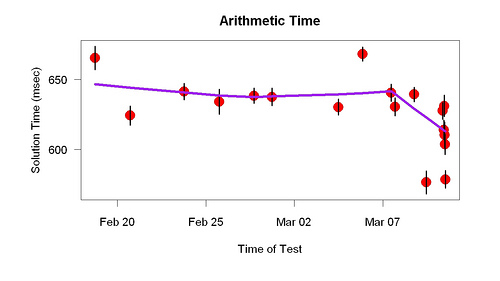I liked many things about this talk by Jacqueline Edelberg, a Chicago artist and political science Ph.D., about how she and other moms transformed their local school. Edelberg has written a book about it called How to Walk to School: Blueprint for a Neighborhood Renaissance. The man who introduced her told a story: In a classroom, he noticed a girl drawing a picture. What are you drawing? he asked. I’m drawing God, she said. You can’t do that. No one knows what God looks like, he said. They will soon, she said.
Edelberg’s story did sound miraculous: Her crummy neighborhood public school, within a year, became an acceptable place for her children. The change had many elements, including an after-school program, a farmer’s market, and painted doors, but I think the most important piece — which Edelberg said little about — was this: Parents were allowed to attend every class. Within two years, said Edelberg, all the bad teachers left.
I call this way of governing top and bottom versus middle. In this case the top was the school’s principal (Susan Kurland, Edelberg’s co-author), the bottom was the parents, and the middle was the teachers. Acting alone, the principal couldn’t control the teachers — she couldn’t fire the bad ones, for example. With the parents’ help, she could control them.
It’s as old as Moses:
1. As I’ve blogged, the Ten Commandments was an agreement between Moses (top) and the preyed-upon men in his community (bottom) against the men who were preying upon them (middle) — stealing from them, for example.
There are other examples:
2. One reason surgical checklists — implemented by hospital administration (top) — work so well, I believe, is that they give nurses (bottom) power over doctors (middle). A nurse can tell a doctor to follow the checklist. The details of implementation also empower the lower-ranking members of the surgical team.
3. In China, what are called (in Chinese) human-flesh searches — a kind of cyber-vigilante-ism — go on with the approval of the central government (top). These searches, which are actually mini-crusades, allow ordinary citizens (bottom) to punish corrupt or otherwise misbehaving local government officials (middle).
I predict that someday someone in the American government (top) will realize that a way to greatly improve health care is to empower patients (bottom) against doctors (middle).
![]() :> :~) — I’m bad at emoticons. But I appreciate other people’s work. From an article about the Lehman report:
:> :~) — I’m bad at emoticons. But I appreciate other people’s work. From an article about the Lehman report:
